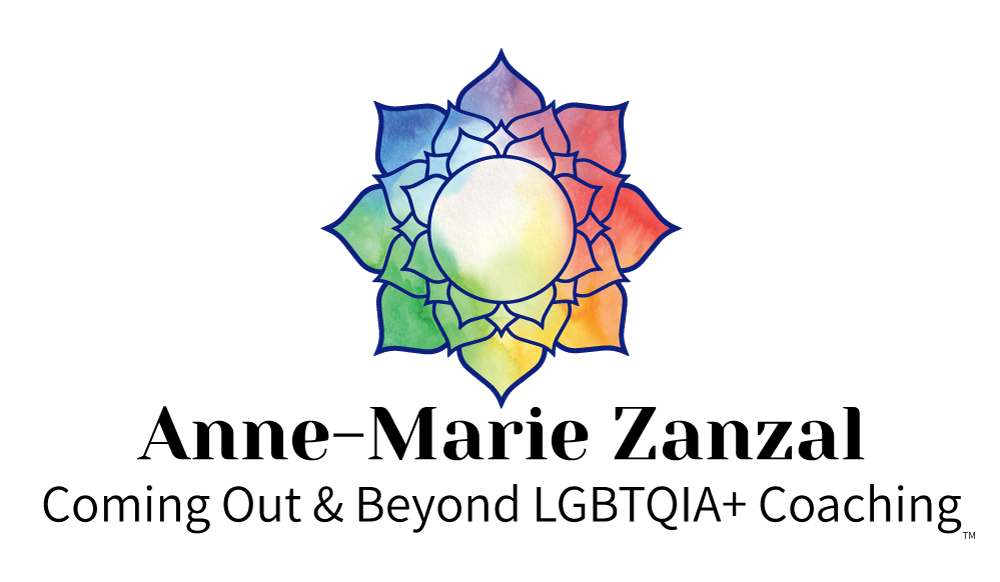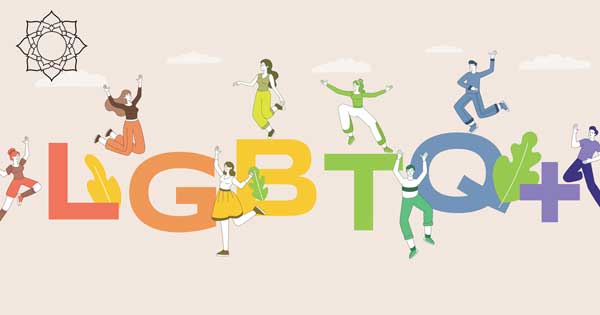Questioning your sexuality and coming out later in life can be overwhelming. Many of us have struggled, wondering where to start, how we didn’t know ourselves sooner, how to trust if what we’re feeling is real, if there are other women like us, and how to move through where we’ve been to where we want our lives to go. If you find yourself wondering any of this, I’ve got an array of helpful resources and I’m sharing some of the best here that have helped me and my clients. These are 5 places to start for women coming out later in life regardless of what label you choose to use, lesbian, bi, gay, queer, I hope they make a difference for you the way they helped me.
1. Why it Takes Women Longer to Figure This Shit Out
There are a host of reasons why it takes longer for women to figure out their sexuality, including the many expectations for girls in our world. We are often taught that relationships with men will be difficult and taught not to listen to or trust our inner voice. We are taught to put our own needs last and take care of everyone else first. Frequently, the only life path we’re shown is one where our lives revolve around our relationships to men. There is some great insight about all this in the following article: Why Do Women Take Longer to Realize Their Gay?
The idea that “the amount of men who knew that they were gay from a young age often seems shockingly higher than that of women” really stuck out to me, especially as someone who took a while understand their sexuality and often felt confused as to why I didn’t figure it out sooner.
Compulsory heterosexuality is real and troubling. I spent so much of my life living in the only way I thought I could and was so disconnected from my own desires and natural state of being for so long that attempting to untangle what was really me and what was because of what I had been taught started out as a multilayered task as I had to learned to trust my inner voice. I thought of myself as a feminist and in my career had broken barriers around women in ministry. It was shocking to realize that some of my deepest held beliefs around marriage and motherhood were not actually “truth” but a way that patriarchal society has programmed me to live.
2. Am I a Lesbian – MasterDoc
If you relate to any of what I have already written, here’s a more extensive article for you. The “Am I a Lesbian MASTERDOC” is filled with comparisons and common experiences of those of us coming out later in life and goes even deeper in its exploration of compulsory heterosexuality. I grew up Roman Catholic, marriage and family was not only just the thing you did, but was considered the only way to be fulfilled in this life. Further, as a woman in Catholicism, and the later Evangelical tradition in which I belonged, my assigned gender made me a second class citizen out of the gate. As a “woke” woman I chafed against this status, I know these beliefs were wrong, yet I never applied them deeply to my own life and how they affected me.
You don’t have to have a religious background to get those messages though (it’s really that common), and questioning your sexuality later in life gives you the opportunity to attempt to uncover where what you were taught overrode who you were and are.
Check Out the Full Document Here >
So many of the points listed in this document absolutely changed my perspective, because I related to them so much. I have never felt more seen than when going through the article’s main points and coming to understand other queer women felt as I did.
For so long I thought that straight women thought about girls the way I did, but now I see past crushes for what they were and it took acknowledging my attraction as an adult to understand that. I have confused nervousness around men with attraction and tried too hard to be interested in them. I struggled to flirt with men and was nervous that I would feel the same way with women. I am happy to report this was not the case and I actually find it fun!
While it’s a long article, it’s an article worth reading and rereading as there are so many more points than these listed to help you understand who you are, redefine your experiences, and to see your sexuality and attraction for what it is — normal.
3. Internalized Homophobia
Many of us are and have been huge advocates for the LGBTQIA+ community. We support any and all members, but don’t look inward enough to see that in them we’ve found our people. Whether consciously thought or not, it happens that the only person who can’t be gay is “me.” This is a great article about internalized homophobia, what it is, how it shows up, and ways to work to overcome it.
Everything about our individual experience affects how homophobia is internalized including our “religion, race, class, geography, gender identity, family, friends, partners, as well all of the prejudices we carry.” That’s why it affects all of us to different degrees.
Unchecked and unchanged, it can lead to lying, secrecy, denial, and even self-hatred. But there are ways to overcome internalized homophobia and the article includes an entire section on how to do that including therapy, self-awareness, critical thinking, and community (like what I offer in my support groups).
4. Coming Out with a Conservative Christian Upbringing Can Be Hard
If you are coming out from a conservative Christian background (as many of us have had to do) it can be particularly daunting. Many conservative churches/religions are openly and vocally anti-LGBTQ+. Fortunately, there are many other groups that not only accept queer folk, but celebrate them. The Cathedral of Hope in Dallas is one of these accepting churches and has some great resources to help you navigate this time and understand where faith can still support you.
One of their guiding principles is that “Sexuality is a God-Given Gift.” Their resources page is full of articles, books, and movie recommendations by a variety of pastors and theologians with an array of perspectives. The hope here is that you find something that speaks to you personally and is useful on your journey of faith, self-expression, and authentic living. Finding an affirming community, religious or spiritual can make a big difference for you as you come out.
5. Resources I Trust & Use Often
If you’re like me and devour everything you can read or study on the topics of queerness and coming out later in life, I’ve got even more suggestions on my resources page:
Here you will find links to articles as well as support groups and ways to contact me for coaching. You can dive into my blog, listen to my podcast that focuses on sharing the stories of women coming out, learn from others’ experiences, and find community as you move forward and live authentically.
Coming out later in life can really take some courage, and be a lot, even though it’s also a worthwhile joy. Don’t be afraid to get more support, particularly if you feel isolated or alone in your journey. I offer coaching, group support, a Patreon support group (starting July 1, 2021), and a free Facebook Group that connects women through this process. The goal is that you can find support and connection with queer women just like you. It would be an honor to support you in your journey and see you take up space in the world in the way that you were always meant to. You’re not alone.
You can contact me here to learn more about the services I offer, and learn more about how to join my facebook group here. Or join the Patreon Group which is launching on July 1, 2021.



Recent Comments